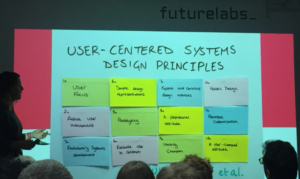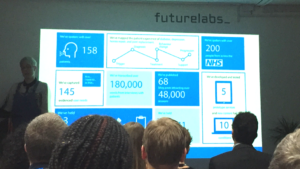 As a strategy consultancy active in FinTech and Digital, we are familiar with helping organisations improve their focus on the end customer and enhancing user experience through technology. So, it was interesting to see how these principles are being embraced and developed in the healthcare sector.
As a strategy consultancy active in FinTech and Digital, we are familiar with helping organisations improve their focus on the end customer and enhancing user experience through technology. So, it was interesting to see how these principles are being embraced and developed in the healthcare sector.
The following notes summarise the main presentations:
Eve Roodhouse, Programme Director, NHS Digital.
The first speaker, Eve Roodhouse introduced NHS Digital as an organisation as well as their role in the wider environment of healthcare. NHS Digital is responsible for making sure that the NHS can make the most out of technology available. More specifically, NHS Digital manages many tech processes currently integrated with the NHS, and helps map out and project manage new innovative initiatives. Looking forward, NHS digital want to lead the NHS into its next phase of technology evolution.
Eve outlined the current environment for NHS digital and how their model for taking on services has become much more regionally focused. This gives individual NHS trusts more freedom and autonomy to trial and partner with a range of tech providers.
Claire Harrison, Department for Work and Pensions Digital Academy.
Next was Claire Harrison from the Department for Work and Pensions (DWP) Digital Academy speaking on the process and challenges of digitising such a large operation.
The DWP has over 90,000 employees, and pays out over £163bn in pensions and benefits. Claire outlined the significant internal challenges associated with digitising this complex function. This includes keeping staff aware of technical and operational changes, and being up-to-date with how to use new systems and processes, as well as developing new departments to help manage data and digital based activities.
The DWP has invested time and resources to transform themselves in to a more digitally optimised operation that can affectively use data to ensure that they can efficiently deliver their services to users. Much of their digital change has focused on streamlining operational processes by making best use of software automation.
Natalie Lovett, Scrum Master, NHS Digital.
 Third speaker Natalie Lovett explained some of the core principles that NHS Digital focuses on when working on new projects.
Third speaker Natalie Lovett explained some of the core principles that NHS Digital focuses on when working on new projects.
These were summarised as:
- User focus: users should actively participate in the development lifecycle, and assessing which features are most used and how they are used.
- Evolutionary systems development: iterative and incremental processes that can be reviewed, streamlined and attributed to central objective at key stages, minimising risk of failed projects.
“31% software projects will be cancelled before completion. Of the projects that do go live, they will launch with 42% of the features/scale than originally proposed.”
- Professional attitude: a multidisciplinary team that connects with creative ideas whilst at the same time continually working towards objectives.
She summed up with key insights that they have learnt through this process:
- Get focused on the users: involve users, focus on features that will actually deliver benefits.
- System development should be evolutionary.
- Bring in a range of skills to complement internal resources.
Danielle Mullis, Designer, NHS.UK.
 Danielle Mullis, a designer for NHS.uk demonstrated how digital testing and analytical tools have helped manage, present and create content that enhances potential, current and past patients in their healthcare journey.
Danielle Mullis, a designer for NHS.uk demonstrated how digital testing and analytical tools have helped manage, present and create content that enhances potential, current and past patients in their healthcare journey.
Danielle focused on understanding the patient journey and creating content that fits with each step that is easily accessible. From symptom discovery and research, to next step actions, to information on procedures as well as follow up interactions. In addition, Danielle explained how NHS.uk has gone through a major streamlining process from not just providing a volume of information (which can become overbearing for patients – to the point of inaction on symptoms), but actually cutting content down and changing the language to be much more ‘next step’ and action orientated.
To guide these decisions, Danielle then summarised the rigorous prototyping, testing, and analytics each webpage version goes through, often numerous times. This testing procedure is a critical process for the NHS, since understanding the patient journey and how individuals not only access but act on the information received, can in this sector be a matter of life and death:
“Providing people with the right information at the right time in the right place”.
Kathryn Grace, Service Design & Innovation Consultant, Stick People.
To conclude, Kathryn Grace explained the purpose and process of user centred design, and how it is applied, especially in regards to heathcare.
She summarised the steps of user centred design, with one interesting aspect being the development of ‘user personas’ and how putting the solution through testing with representative end users can help develop critical evaluation and improvements for patients and clinicians.
Kathryn also outlined how important it is to have the right people test your product. She really emphasised that in sectors such as healthcare, the users of your solutions should be critically involved in the development process. She also admitted that getting the right people in the room to fully test your solution can be difficult, but incredibly valuable.
Overall, Healthtech Women and NHS Digital provided some truly insightful content at a very informative event, with numerous take-away points. Perhaps most interestingly, the event demonstrated that the best practice design and development principles, which have been deployed in the private sector for several years, are ‘alive and well’ in public healthcare.

If you are involved in the healthcare and/or technology sectors, you may be interested in attending our showcase event HealthTech North 2017. Hosted at Leeds First Direct Arena, this event has a great line up of keynote speakers, discussing various topics around the HealthTech space. Read more here or sign up here.